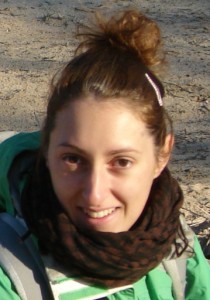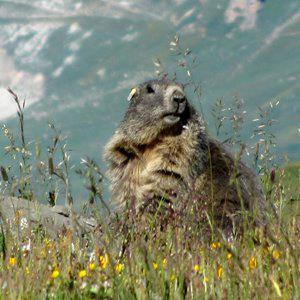This content has been archived. It may no longer be relevant

My research uses theoretical and experimental approaches to address a broad range of fundamental questions related to adaptive responses of the organism to environmental factors. I am working on the importance of phenotypic plasticity, particularly physiological plasticity, in overcoming current climate changes. I am especially interested in determining the mechanisms underlying the regulation of adaptive responses, including behavioural and physiological parameters (thermoregulation, metabolism, hormonal rates) and fitness components (body mass variation, reproductive success, offspring performances, immune response, survival rate).
My studies are mainly based on multidisciplinary approaches, associating data from physiological, population, evolutionary, immune and behavioural ecology. Research topics covered so far are:
- Adaptive Responses of Alpine Marmot (Marmota marmota) to Climate Change
- The evolution of endothermy in mammals: A test of the Pleisiomorphic-Apomorphic Model with energetics and behavioural data from heterothermic primates (Microcebus sp.)
- Climate change and adaptative responses: Phenotypic flexibility and energetical trade-offs in a heterothermic primate (Microcebus murinus)
- Acclimation and heat shock in parasitic wasps (Aphidius avenae)
- Social rank in domestic cat (Felis sylvestris catus)
I am currently developping a multi-disciplinary approach linking genotypic, phenotypic, individual, and population levels of organization. I will provide a powerful integrative framework for predicting the vulnerability (or resilience) of the Alpine marmot (Marmota marmota) in the face of environmental change, and thus provide the knowledge necessary to implement objective and accurate conservation strategies.
More information on the Alpine Marmot project can be found here.
And, when I am not trapping lemurs in Madagascar or marmots in the Alps, I love chasing all other kinds of animals including butterflies, lizards and frogs…
CV
2013-2015 Postdoctoral Research Associate, Institute of Evolutionary Biology and Environmental Studies, University of Zurich, Switzerland
2011-2012 Postdoctoral Research Associate, School of Biological and Conservation Sciences, University of KwaZulu-Natal, South Africa
2007-2010 PhD in Ecophysiology, University Pierre et Marie Curie (Paris VI), UMR CNRS/MNHN, Brunoy, France
2006-2007 Postgraduation in Ecophysiology and Ethology, University Louis Pasteur, Strasbourg, France
2005-2006 MSc in Ethology, University Paris XIII, Villetaneuse, France
2002-2005 BSc in Life Science and Organisms Biology, University Savoie Technolac – Bourget du Lac, France
- Lovegrove BG, CanaleCI, Levesque D, Fluch G, Řeháková-Petrů M, Ruf T (2014) Are tropical mammals physiologically vulnerable to Arrhenius effects and climate change? Physiological and Biochemical Zoology – Special Issue ‘Conservation Physiology’ 87(1):30-45
- Canale CI, Huchard E, Perret M, Henry PY (2012) Reproductive resilience to food shortage in a small heterothermic primate. Plos One 7(7): e41477
- Canale CI, Levesque D, Lovegrove BG Tropical heterothermy – does the exception prove the rule or force a re-definition? (2012) In: Ruf T, Bieber C, Arnold W, Millesi E (Eds) Living in a Seasonal World: Thermoregulatory and Metabolic Adaptations, Springer, Vienna, p29-40
- Canale CI, Perret M, Henry PY (2012) Torpor use during gestation and lactation in a primate Naturwissenchaften 99(2):159-163
- Huchard E, Canale CI, Le Gros C, Perret M, Henry PY, Kappeler P (2012) Convenience polyandry or convenience polygyny? Costly sex under female control in a promiscuous primate. Proceedings of the Royal Society B – Biological Sciences 279(1732):1371-1379
- Languille S, Blanc S, Blin O, Canale CI, Dal-Pan A, Devau G, Dhenain M, Dorieux O, Epelbaum J, Gomez D,Hardy I, Henry PY, Irving EA, Marchal J, Mestre-Francés N, Perret M, Picq JL, Pifferi F, Rahman A, Schenker E,Terrien J, Théry M, Verdier JM, Aujard F (2012) The grey mouse lemur : A non- human primate model for ageing studies. Ageing Research Reviews 11(1):150-162
- Canale CI, Perret M, Thery M, Henry PY (2011) Physiological flexibility and acclimation to food shortage in a heterothermic primate. Journal of Experimental Biology 214(4):551-560 (highlighted in Inside JEB: http://jeb.biologists.org/content/214/4/ii.full.pdf)
- Canale CI, Henry PY (2011) Energetic costs of the immune response and torpor use in a primate. Functional Ecology 25(3):557-565
- Canale CI, Henry PY (2010) Adaptive phenotypic plasticity and resilience of vertebrates to increasing climatic unpredictability. Climate Research 43(1-2):135-147
- Canale C (2009) Could daily torpor be modulated in response to environmental challenges? Comparative Biochemistry and Physiology A- Molecular & Integrative Physiology – Conference Proceedings 153A(2):S58-S59


